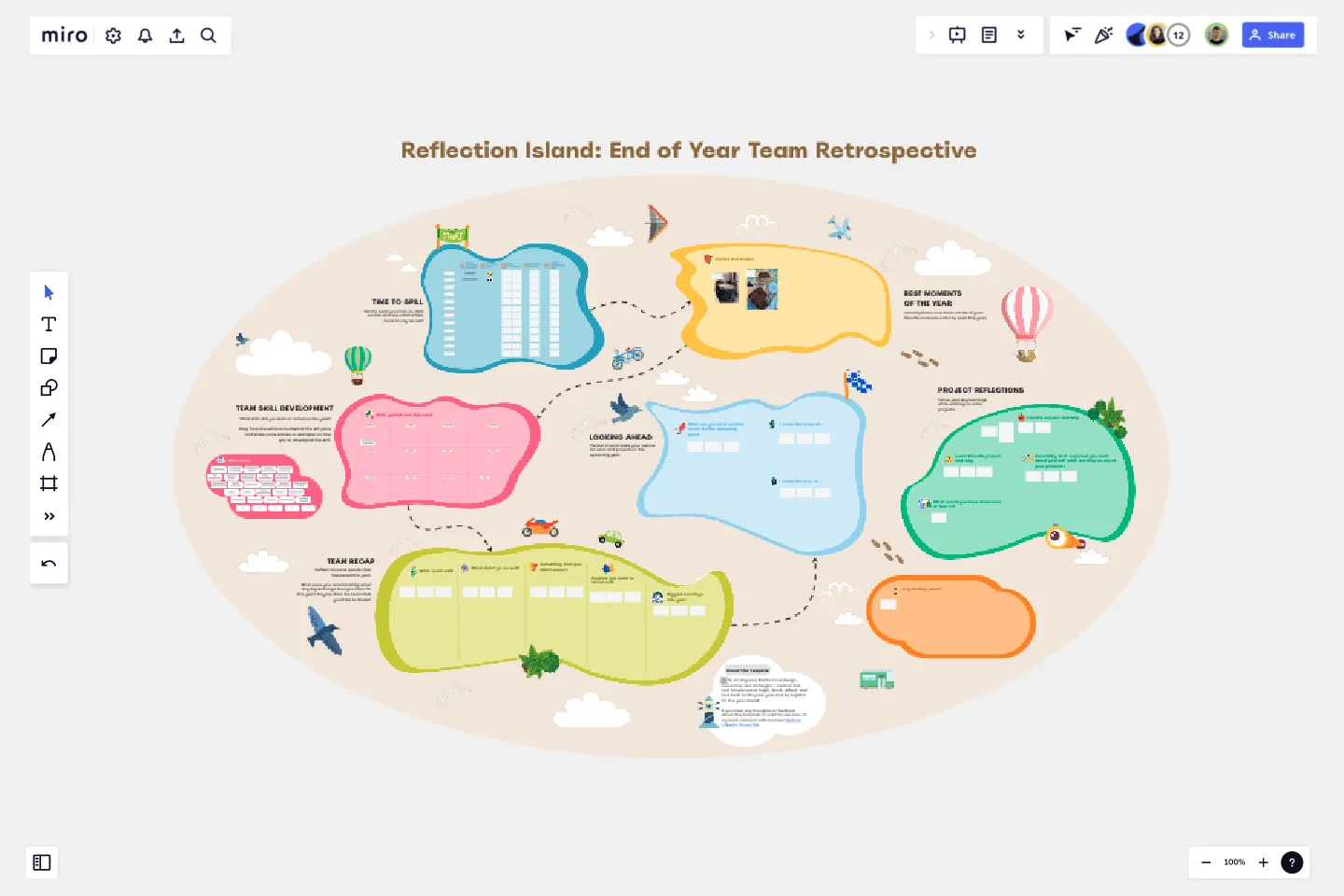Reflection Island: End of Year Team Retro
This End-of-Year Retrospective tool is aimed to help teams look back on the past year, bond, share some laughs, and be hopeful for the year ahead.
Designed with an island theme, participants will explore different parts of the island and share their thoughts and experiences.
Time to Spill: Tell the team your not-so-dark secrets (think: favorite emojis, motivational song) and see what others have to say as well.
Best Moments of the Year: Share some photos and stories of your favorite moments with the team.
Team Skill Development: Reflect on the skills that you have gained or improved this past year.
Team Recap: Share with everyone your small and big wins, some unexpected teaching moments, and a teammate that you'd like to give kudos to.
Looking Ahead: Ponder on and share your visions for work and projects this upcoming year.
Project Reflections: Share your key learnings while working on projects.
Holiday Plans: Tell what you're looking forward to this holiday season.
This tool can be tweaked to change questions or remove topics. It can also be filled out individually to be discussed as a group or fill out as part of a dedicated team retrospective meeting.
This template was created by Aryanna Martin.
Get started with this template right now.
Fishbone Diagram for Product Development
Works best for:
Fishbone Diagram
Enhance your product development process with the Fishbone Diagram for Product Development. This template helps you identify potential issues and their root causes, ensuring a thorough analysis before product launch. Use it to streamline development, reduce risks, and improve product quality. Perfect for product managers and development teams aiming to deliver high-quality products efficiently.
Product Thinking Board
Works best for:
Product Management, Planning
Product Thinking Board template encourages a user-centered approach to product development. By fostering empathy, collaboration, and experimentation, this template stimulates innovative thinking and problem-solving. With sections for user research, ideation, and prototyping, it supports iterative product design and validation. This template serves as a visual framework for product teams to engage in user-centric design thinking processes, driving the creation of products that truly meet user needs and deliver exceptional experiences.
Working Backwards Template
Works best for:
Desk Research, Strategic Planning, Product Management
Find out how to use the Working Backwards template to plan, structure, and execute the launch of a new product. Using the template, you’ll figure out if the product is worth launching in the first place.
HEART Framework Template
Works best for:
Desk Research, Project Management, User Experience
Happiness, Engagement, Adoption, Retention, and Task Success. Those are the pillars of user experience — which is why they serve as the key metrics in the HEART framework. Developed by the research team at Google, this framework gives larger companies an accurate way to measure user experience at scale, which you can then reference throughout the product development lifecycle. While the HEART framework uses five metrics, you might not need all five for every project — choose the ones that will be most useful for your company and project.
Gap Analysis Template
Works best for:
Marketing, Strategic Planning, Business Management
Consider your team’s or organization’s ideal state. Now compare it to your current real-world situation. Want to identify the gaps or obstacles that stand between your present and future? Then you’re ready to run a gap analysis. This easy-to-customize template will let your team align on what obstacles are preventing you from hitting your goals sooner, collaborate on a plan to achieve those goals, and push your organization toward growth and development. You can focus on specific gap analyses — including for skills, candidates, software, processes, vendors, data, and more.
Lean Canvas Template
Works best for:
Agile Methodology, Strategic Planning, Agile Workflows
Business opportunities can get dense, cumbersome, and complex, and evaluating them can be a real challenge. Let a lean canvas streamline things and break down your business idea for you and your team. A great tool or entrepreneurs and emerging businesses, this one-page business model gives you an easy, high-level view of your idea — so you can stay focused on overall strategy, identify potential threats and opportunities, and brainstorm the various factors at play in determining your potential profitability in an industry.
